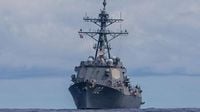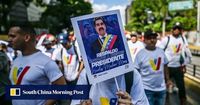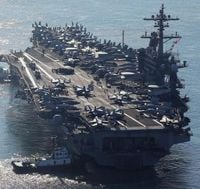As U.S. warships edge ever closer to Venezuelan waters, the Caribbean finds itself at the heart of a mounting geopolitical standoff—one whose implications ripple from Washington to Port of Spain and beyond. On August 22, 2025, the region awoke to the reality of an unprecedented U.S. naval deployment, with Trinidad and Tobago (T&T) perched squarely in the middle of the diplomatic crossfire. Yet, amid the drumbeat of military maneuvers and political posturing, leaders across the Caribbean are emphasizing a single refrain: neutrality, vigilance, and the preservation of peace.
The latest tensions began with a direct order from U.S. President Donald Trump, who authorized the deployment of three Arleigh Burke–class destroyers—the USS Jason Dunham, USS Sampson, and USS Gravely—to South American waters. Their mission? To interdict cartel traffickers, particularly in the waters near Venezuela. According to The Washington Post, these destroyers, bristling with Tomahawk missiles and carrying 4,500 U.S. service members (including 2,200 Marines), have been given explicit authority to stop and board suspected smuggling vessels. It’s a bold shift: the U.S. Navy, usually a supporting actor in counternarcotics operations, is now thrust into a frontline role.
For Admiral James Stavridis, the symbolism is impossible to ignore. “For pure counternarcotics operations, the multibillion-dollar Aegis destroyers are overkill,” he told The Washington Post. “But as a signal to Nicolás Maduro, the arrival off his coast of dozens of Tomahawk missiles…is a very strong one.” The message to Caracas is clear: Washington is willing to escalate, and the region is watching closely.
Venezuela, for its part, has answered with defiance. Foreign Minister Yván Gil dismissed U.S. accusations of drug trafficking as “proof of Washington’s failure,” while President Nicolás Maduro took to the airwaves to announce the mobilization of more than 4.5 million militia members across the country, vowing to “defend national sovereignty.” The U.S. has also doubled down, raising its reward for information leading to Maduro’s arrest to $50 million—alleging deep ties between the Venezuelan leadership and international drug trafficking.
Yet the deployment comes on the heels of what some call “policy whiplash.” Just weeks prior, the White House had quietly approved Chevron’s return to Venezuelan oil fields and overseen a prisoner swap that freed the last ten Americans held in Caracas. Deportation flights carrying Venezuelan migrants have resumed. The juxtaposition is striking: détente on energy and detainees, destroyers on the horizon.
For Trinidad and Tobago, less than seven miles from Venezuelan shores, the proximity of U.S. warships is more than a distant headline. Foreign Affairs Minister Sean Sobers sought to reassure the public in a national television interview on August 22. “There is absolutely no need for any concern, panic, worry, trepidation. If that thought ever enters anyone’s mind, you should perish it immediately,” he said on CNC3, emphasizing that T&T is taking no side in the standoff and that the government intends to maintain its longstanding non-interventionist approach. “We have good bilateral relations with both countries – the US and Venezuela. We intend on keeping it that way.”
Sobers also addressed the Status of Forces Agreement (SOFA) signed with the U.S. in December 2024, which allows for military-to-military engagement between the two nations. He clarified, however, that there have been “no talks…with the US on using TT as a base” and reiterated that any deployment of U.S. ships in the Caribbean is solely “their prerogative.”
International relations expert Dr. Anthony Gonzales echoed this call for neutrality, urging the government to “steer a ship of neutrality and non-alignment.” Speaking with Guardian Media, Gonzales noted, “You have to be very cautious and try not to get involved on one side or the other…try as hard as possible to get some diplomacy going or negotiation going between two parties.” He further warned that T&T should “resist” any attempt by the U.S. to use its territory as a staging area for military operations, adding, “We have to see how things develop and…wait and see the intentions of the Americans.”
Regional security expert Dr. Garvin Heerah also weighed in, pointing out that while the presence of U.S. military vessels in Caribbean waters is not unprecedented, “there is tension in the atmosphere and we are inching towards a conflict zone.” He stressed that diplomatic engagement and readiness are essential, as “a conflict zone can have serious repercussions for everyone.”
Meanwhile, the Movement for Social Justice (MSJ) leader David Abdulah has emerged as one of the most vocal critics of the U.S. military buildup. “We totally reject the so-called pretext for this unprecedented assembly of naval and other military assets and personnel as being one to ‘deal with narco-trafficking,’” Abdulah declared, asserting that the real intent is “to effect regime change in Venezuela.” He condemned the $50 million bounty on Maduro as further evidence of U.S. “hypocrisy and duplicity” and called on Caricom states to break their silence, urging them to reaffirm the region as a “Zone of Peace.”
Former Prime Minister Dr. Keith Rowley also called on the government to “find its tongue” and defend the Caribbean as a zone of peace. “As the US armada sails in our direction, the government of TT is being tested here,” Rowley wrote online, expressing hope that leaders would not be “found wanting.” He criticized opposition politicians for, in his view, supporting U.S.-led regime-change policies and undermining regional diplomatic efforts. “Now that the chickens are coming home to roost, the question for the people of TT is whether it is better to follow unpatriotic opposition folly or maintain sovereignty and diplomatic self-interest in Government.”
Stuart Young, another former prime minister, urged regional leaders to stay the course on non-intervention and non-interference. “Caricom and our region is a recognised zone of peace and it is critical that this be maintained,” he told Newsday. “TT has consistently respected and upheld the principles of non-intervention and non-interference in the internal affairs of other countries and for good reason. I trust that our allies will also respect and uphold these principles.”
The opposition, led by Pennelope Beckles, has expressed concern as well, promising a special press conference to address the unfolding crisis and its implications for T&T.
All sides agree on one thing: the stakes are high. The deployment of U.S. destroyers, the mobilization of Venezuelan militias, and the rhetoric from both Washington and Caracas have set the stage for a test of diplomacy, deterrence, and regional resolve. For the Caribbean, which has long prided itself on being a “Zone of Peace,” the coming weeks may well determine whether it can maintain that cherished status amid the swirling currents of global power politics.
As the radars grow busier and the politics hotter, leaders in Port of Spain and across the region are left to navigate a delicate path—one that demands vigilance, restraint, and, above all, a steadfast commitment to peace.






